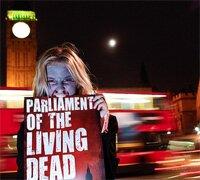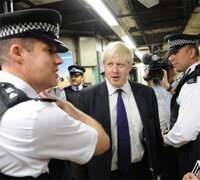Judge not lest ye be overheard
Well, it seems very much that the ‘hot’ story for the start of this week is the suggestion that a private conversation between a Labour MP and a constituent, Babar Ahmad, who happens to be inside awaiting (possible) extradition to the US on terrorism charges relating to his having been involved in the running a website which supported, and solicited funds for the Taliban and for (unspecified) Chechen groups, may have been covertly recorded by the security services.
I do agree with Nick Robinson, to some extent, that the timing of the story is a trifle unfortunate for those MPs who are currently huffing and puffing over this alleged breach of the Wilson doctrine:
Amidst the outrage in Westminster at the alleged phone tapping of an MP, no-one has really explained why MPs should be treated differently to, say, lawyers or doctors who have relationships based on confidentiality.
Coming on the back of the weekend’s flurry of MP’s expenses stories a la Conway there may be some merit in Nick’s observation that:
Westminster should be on standby for voters incensed by the Conway affair to demand to know why MPs should be protected when they are not.
But such an observation misses the broader point as do those, like Iain Dale, whose interest in the story runs largely to questions of who authorised what – it is, I think, naive and not just a little bit stupid for anyone to assume that the security services have been required to obtain individual warrants for each and every occasion they want to listen in on Mr Ahmad, it being much more likely that his situation has been deemed to be justification for a general warrant covering just about all circumstances.
In short, if his conversation with Sadiq Khan MP was recorded, it was recorded only because the security operative in question either failed to recognise (or disregarded) the fact that this meeting constituted an exception to what was otherwise a general ‘rule’ he or she was operating under. The real question here is, therefore, not simply whether the Wilson doctrine has been breached but whether, and in what circumstances, other privileged conversations (like those between Ahmad and his legal counsel) may also have been routinely recorded.
This is a bigger issue than simply that of one MP and a convention that applies to a little over 1,500 people (Westminster MPs and Peers), in fact the real problem is nicely illustrated by this (expanded) list of possibilities for Iain:
1. It was authorised by the Head of Mi5 with no reference to a politician
2. It was authorised by the Home Secretary (Khan is her whip!)
3. It was authorised by the Justice Secretary (unlikely)
4. It was authorised by the Prime Minister
And from Chris Paul:
5. It was not authorised by the head of MI5 OR by a politician
6. The bugging was not carried out by a UK agency
7. It did not happen
There is an important word missing from the list, one that neatly sums up the entire problem with the current system under which ‘bugging’ is undertaken…
… and the word is ‘Judge’.
What is fundamentally unacceptable here is that there is not a single shred of judicial oversight in the whole system, and before anyone gets too overwrought at the possibility that Wilson doctrine has been breached, lets hear the politicians, of all parties, explain why that should be the case. After that, then we can get down to the question of whether MPs (or anyone else) should be afforded a privileged status within the system.
-------------------------
| Tweet |
'Unity' is a regular contributor to Liberal Conspiracy. He also blogs at Ministry of Truth.
· Other posts by Unity
Filed under
Blog
10 responses in total ||
Hi
Can I offer a defence of the doctrine – I know its not seemingly as big an issue as that of the liberty of individuals accused of terrorist activity – but the doctrine has good grounds.
Watergate
Who can authorise the tapping of a politicians? – what if the politician is an opponent? – how can tapped information be used by opponents? – and so on.
Tapping politicians is just too dangerous for democracy to survive it unscathed.
You’re correct is saying that there are sound democratic reasons for treating MPs communications as being privileged in law, but at the same time one has to ask whether, in its absence, MPs would be quite so keen on passing laws which allow surveillance of citizen’s to be conducted without judicial oversight.
I’m not saying that we should dispense with the Wilson Doctrine, what I am saying is what we should be concerned will, first and foremost, is addressing the lack of judicial oversight in the system – after that we can, then, get around to the question of whether specific groups (MPs, Lawyers, Doctors) should be privileged, in what circumstances and to what extent.
Unity
I think the exception with MPs is somewhat different to the exception of lawyers and doctors.
GPs and Lawyers would make the case for an exception on the grounds of the need for confidentiality to do their jobs. MPs would make the case for their exception on the grounds of keeping dictatorship from our doors.
however – I agree that surveillance of suspects in any case should be subject to judicial oversight.
I don’t know what permission the police need at present. For all I know they already need a court order to wiretap Mr Ahmed, and already had one. If not then that needs changing.
But what should be made clear is that when that permission is granted (by whoever grants it) there should be clear exceptions to all permission – so if Mr Ahmed talks to an MP, his lawyer, or a doctor, the recording must stop.
“2. It was authorised by the Home Secretary (Khan is her whip!)”
Not at the time, when the Home Secretary wasn’t a she, it was either Clarke or Reid depending on timing. The PM, therefore, would have been one T. Blair.
According to Private Eye’s Christmas edition there’s another bunch of bugging in a related case, the arrest of the journalist Sally Murrer. She was allegedly heavily bugged by the police who were investigating the Ahmad/Khan-bugger Mark Kearney for supplying her with stories. Working out how all this fits together is unfortunately difficult owing to the Daily Mail being the only newspaper doing any proper investigation, and you can’t trust them, really, but the enormous reaction to Murrer/Kearney’s alleged misdeeds contrasts rather strongly with other times when the Old Bill has put stuff in the papers, like the Koyair brothers or the Stockwell shooting. Can we say ‘scapegoat’?
Stop Bair from EU presidency
http://stopblair.eu/indexen.html
Noel
Why? He might do quite a good job and ban the bugging of politicians across the continent.
Let’s not forget that the Wilson Doctrine was implemented because Harold Wilson wanted to prevent himself from being the subject of any tapping investigation. Nixon was a different matter, as he tapped himself in an attempt to provide self-vindication to history.
There were several suggestions at the time that the Labour party and govt had been infiltrated by soviet sympathisers/double agents (identified suspects included Charles Clarke, as I recall, later to be installed, in a twist of irony, as Home Secretary – you’d think he would remember).
The case was made by the security services that they were justified in avoiding any exemptions in order to prevent a militant revolution (even from within government), whereas the office of the PM was justified in introducing the exemption in order to prevent a military coup (particularly from within military intelligence).
Stories abounded at the time regarding the possibility of either, depending on which wing of the press you read, but it was the nature of the power stuggles during the Cold War that everyone was second-guessing each other.
The irony of this matter today is that bugging is a direct consequence of the return to that Cold War mentality under this Labour regime, being the way Blair/Brown have bypassed and undermined solid procedures in their respective overbearing legislative programmes, which, in turn, opened the possibility that the application of legal powers could be undertaken inconsistently.
Thomas
I was with you up to your last paragraph – up to then you set out exactly the sorts of reasons why the doctrine should stand.
After that you make statements about the government as though the Troubles, the Cold War, and so on did not foster the same mentality in all governments, and that the same is not true of all governments everywhere.
#9 Huh?
On the one hand it’s good, but on the other it’s only natural to expect those with positions to influence application of this doctrine (or any other for that matter) to do so in a way that secures their interests or the interests of the office which they are working from… are you trying to defend the indefensible?
Too many laws and new powers have been put in place that we now have a situation of of legislative and operative conflict – this government has brought chaos where once there was order, and it did so because it panicked in the face of the threat of violence when it should have been steadfast in its resolution against it.
Reactions: Twitter, blogs
-
Ministry of Truth » Blog Archive » Judge not lest ye be overheard
[...] (Cross-posted at Liberal Conspiracy) [...]
Sorry, the comment form is closed at this time.
You can read articles through the front page, via Twitter or RSS feed.
» Ten myths about housing benefit reforms in London
» What if Superdrug lived up to its name?
» Why we want to ‘recall’ Aaron Porter as NUS President
» Breakthrough in drugs debate as MPs call for full decriminalisation
» Report shows how the promise on NHS spending has been broken
» Why climate talks in Cancun failed miserably
» Why cuts to local councils will be much worse than Tories suggest
» Left unity and the bid to oust Aaron Porter
» The true horror of NHS privatisation is slowly coming out
» Why these protests are more dangerous than politicians realise
» How the police and then the BBC tried to humiliate Jody McIntyre
|
7 Comments 4 Comments 14 Comments 44 Comments 39 Comments 34 Comments 19 Comments 33 Comments 34 Comments 72 Comments |
LATEST COMMENTS » Chaise Guevara posted on Why Labour was right to reject Bob's drug policy » Paul Sagar posted on Why Labour was right to reject Bob's drug policy » Chaise Guevara posted on Why Labour was right to reject Bob's drug policy » Shatterface posted on Why Labour was right to reject Bob's drug policy » George Gabriel posted on Labour voters switch to supporting AV in new poll » Watchman posted on Why Labour was right to reject Bob's drug policy » Tim Fenton posted on Why Labour was right to reject Bob's drug policy » Watchman posted on Why Labour was right to reject Bob's drug policy » pagar posted on Why Labour was right to reject Bob's drug policy » Lisa @ Doorway posted on Ten myths about housing benefit reforms in London » Ted posted on Why Labour was right to reject Bob's drug policy » Andy S posted on Ten myths about housing benefit reforms in London » Plymouth Greens posted on Ten myths about housing benefit reforms in London » Shatterface posted on Why Labour was right to reject Bob's drug policy » ukliberty posted on Why Labour was right to reject Bob's drug policy |















